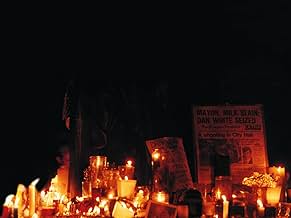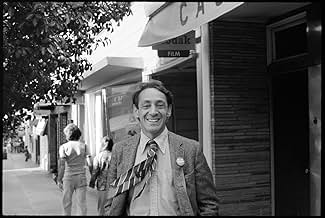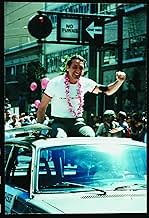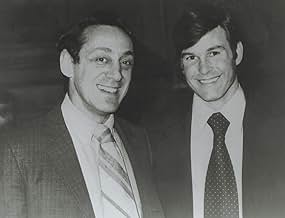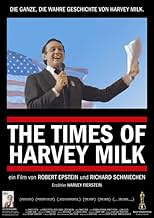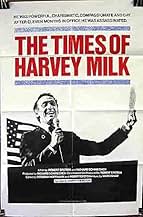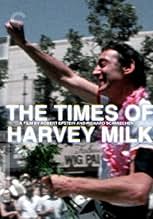CALIFICACIÓN DE IMDb
8.2/10
6.9 k
TU CALIFICACIÓN
Sobre la exitosa carrera y el asesinato del primer supervisor municipal gay electo de San Francisco.Sobre la exitosa carrera y el asesinato del primer supervisor municipal gay electo de San Francisco.Sobre la exitosa carrera y el asesinato del primer supervisor municipal gay electo de San Francisco.
- Dirección
- Guionistas
- Elenco
- Ganó 1 premio Óscar
- 11 premios ganados y 2 nominaciones en total
Harvey Milk
- Self
- (material de archivo)
John Briggs
- Self
- (material de archivo)
Jerry Brown
- Self
- (material de archivo)
Jimmy Carter
- Self
- (material de archivo)
Dianne Feinstein
- Self
- (material de archivo)
- (as Mayor Dianne Feinstein)
David Fowler
- Self - TV Interviewer of Dan White
- (material de archivo)
Joseph Freitas
- Self
- (material de archivo)
Terence Hallinan
- Self
- (material de archivo)
George Moscone
- Self
- (material de archivo)
- Dirección
- Guionistas
- Todo el elenco y el equipo
- Producción, taquilla y más en IMDbPro
Opiniones destacadas
10pyotr-3
STUNNING. That's the only word to describe this film. If you haven't seen it, prepare to be amazed. Clear the room and remove any distractions because you won't want to miss a second of this remarkable recounting of the Harvey Milk story. Prepare to cry and scream, because you will do both.
"The Times of Harvey Milk" covers a bit of American history that almost NO Americans seem to know about, and this is a tragedy. Everyone should know about these events, and the astonishing, beautiful people who participated in them. Perhaps the most stunning moment to me comes when a red-haired straight woman, who became a frequent customer in Harvey Milk's camera & film-processing shop, recalls the night after Milk and Mayor Mosconi were killed. Her description, her face, and her tears make me cry every time I see it. And when Dan White was given a slap on the wrist for murdering Milk and Mayor George Mosconi... because the jurors thought he was under the influence of too many TWINKIES... the city erupted. The film of these riots is stunning, and you may find yourself wishing that you could be there with the rioters who STOOD UP to this historic injustice and demonstrated their rage.
People of all ages and all political persuasions will find this film a remarkable document of an important bit of American history. I believe it is essential viewing for all.
"The Times of Harvey Milk" covers a bit of American history that almost NO Americans seem to know about, and this is a tragedy. Everyone should know about these events, and the astonishing, beautiful people who participated in them. Perhaps the most stunning moment to me comes when a red-haired straight woman, who became a frequent customer in Harvey Milk's camera & film-processing shop, recalls the night after Milk and Mayor Mosconi were killed. Her description, her face, and her tears make me cry every time I see it. And when Dan White was given a slap on the wrist for murdering Milk and Mayor George Mosconi... because the jurors thought he was under the influence of too many TWINKIES... the city erupted. The film of these riots is stunning, and you may find yourself wishing that you could be there with the rioters who STOOD UP to this historic injustice and demonstrated their rage.
People of all ages and all political persuasions will find this film a remarkable document of an important bit of American history. I believe it is essential viewing for all.
The life and aftermath in death of wonderfully wry and droll Harvey Milk, San Francisco's first openly gay city official who, along with Mayor George Moscone, was killed on a November day in 1978 by disgruntled ex-colleague Dan White (who ultimately received an unusually light sentence after his trial). From Milk's sneaky campaigning tricks to the infamous 'Twinkie Defense', this documentary is solid and involving. It has a creepy ambiance that is difficult to shake after it's over, yet there's a darkly amusing undercurrent throughout (which Milk himself might've appreciated!). The film says to take these events seriously, but to take them AS events. See the humor in the chaos. This was a deserved Oscar winner for Best Documentary Feature; it is quite moving, funny, despairing--never clinical or cold. *** from ****
10Ozdachs
I felt it was a powerful film as I saw it as a new arrival in SF in 1984. I didn't understand its power, though, until the documentary ended and the theather kept the lights very low. As I got up and started walking to the exit, I realized that most of the audience kept their seats. Very odd, since the credits and EVERYTHING had ended. The folks were just sitting and crying.
Art has historically been used to let people rethink and understand the events of their times. (Think Shakespeare.) This film is that type of "art".
Art has historically been used to let people rethink and understand the events of their times. (Think Shakespeare.) This film is that type of "art".
10bandw
The title of this excellent documentary is well chosen, since it is as much about a time and a place as it is about Harvey Milk. The time is the late 1970s and the place is San Francisco. After quickly covering some biographic details the movie concentrates on Milk's campaign to get elected to the San Francisco Board of Supervisors. After three unsuccessful attempts he wins, becoming the first openly gay man to be so elected. As much of a breakthrough as that was, it must be kept in mind that Milk was elected representing a heavily gay district.
Things have changed a lot in thirty years, since some U.S. congressmen are now openly gay. But the issue of acceptance of homosexuality is still contentious, as proved by the passage in 2008 of Proposition 8 that changed the California Constitution to ban gay marriage. This documentary is relevant since it shows where things started to change.
A good part of the film is devoted to consideration of California's Proposition 6 that was put before the public in 1978. Proposition 6 would have banned gays and lesbians from working in public schools. Of course Milk was heavily involved in opposition to the Proposition and it was a peak moment for him and the gay community when the proposition failed. The filming of the celebration of this in the gay community is a high point of the film.
It was only shortly after the defeat of Proposition 6 that Milk and San Francisco Mayor George Moscone were assassinated by Dan White, a fellow supervisor who had recently resigned, but was seeking reinstatement. The spontaneous candlelight vigil on the evening of the assassination that comprised some 40,000 people marching from the Castro neighborhood to City Hall was captured on film from the roof of a nearby building and is an exceedingly moving emotional highlight of the film.
This film is clearly tilted to present Milk in a favorable light and indeed that is not difficult, since Milk's charisma comes across strongly. However, it is mentioned that Milk was subject to fits of anger and could be difficult to work with. Also, Dan White's anguished testimony at his trial is played and he seemed genuine in his expression of regret, but hardly enough to exonerate him in the minds of most people. When White got what was considered a light seven year sentence, the ugly rioting and vandalism that resulted were not whitewashed. White was released from prison after serving five and a half years and committed suicide less than two years later. So, in the end he paid the price for his crimes.
The interviews with some of Milk's associates almost ten years after his assassination are very effective. They are all articulate and insightful about themselves and the history of the times of Harvey Milk.
The use of documentary footage from the time is effective and either a gay or a straight can appreciate this documentary as history.
Things have changed a lot in thirty years, since some U.S. congressmen are now openly gay. But the issue of acceptance of homosexuality is still contentious, as proved by the passage in 2008 of Proposition 8 that changed the California Constitution to ban gay marriage. This documentary is relevant since it shows where things started to change.
A good part of the film is devoted to consideration of California's Proposition 6 that was put before the public in 1978. Proposition 6 would have banned gays and lesbians from working in public schools. Of course Milk was heavily involved in opposition to the Proposition and it was a peak moment for him and the gay community when the proposition failed. The filming of the celebration of this in the gay community is a high point of the film.
It was only shortly after the defeat of Proposition 6 that Milk and San Francisco Mayor George Moscone were assassinated by Dan White, a fellow supervisor who had recently resigned, but was seeking reinstatement. The spontaneous candlelight vigil on the evening of the assassination that comprised some 40,000 people marching from the Castro neighborhood to City Hall was captured on film from the roof of a nearby building and is an exceedingly moving emotional highlight of the film.
This film is clearly tilted to present Milk in a favorable light and indeed that is not difficult, since Milk's charisma comes across strongly. However, it is mentioned that Milk was subject to fits of anger and could be difficult to work with. Also, Dan White's anguished testimony at his trial is played and he seemed genuine in his expression of regret, but hardly enough to exonerate him in the minds of most people. When White got what was considered a light seven year sentence, the ugly rioting and vandalism that resulted were not whitewashed. White was released from prison after serving five and a half years and committed suicide less than two years later. So, in the end he paid the price for his crimes.
The interviews with some of Milk's associates almost ten years after his assassination are very effective. They are all articulate and insightful about themselves and the history of the times of Harvey Milk.
The use of documentary footage from the time is effective and either a gay or a straight can appreciate this documentary as history.
Epstein (and Friedman) make documentaries by assembling talking heads, news footage, and narration -- they make documentaries about events and phenomena, not about detailing lives as they happen. This is an event timepiece, and it hits a weak spot in me -- it's a good movie regardless, but it twists something that makes my heart ache. The movie itself might not warrant such a high rating, but what it depicts does evoke very strong emotions, specifically in the last half hour: you come out of the movie shattered and raging. It's a very lean hour and-a-half, and it manages to cram in as much of a sense of the time, at least in terms of the gay perspective, as possible. Epstein's movie is about the gay experience, but he's not a propagandist: he's more than willing to show that the Democratic Jimmy Carter didn't want to be photographed with Milk, that his sister offered to "cure" Milk of his homosexuality through religion; and he's open to showing that Ronald Reagan, much despised in the gay community, did not support California's Proposition 6, which would make it legal to fire existing teachers who were openly gay.
The film's aim is to make a martyr out of Milk -- but then, he is one, isn't he? He knew his own assassination was coming, or felt that it could; it's why he taped his own will assuming it might be heard if in fact he was assassinated (though he likely wouldn't have known it would be an angry former fellow city supervisor who would kill him). When the head of the city supervisors announces that the mayor and Milk have been killed, presumably by Dan White, distraught about not being re-selected as a city supervisor after resigning the position and then wanting it back, it's like an electric shock to the back of your neck, the crowd of news reporters shrieking in disbelief. The story is famous: White, who shoots Milk five times (once in the head), is found guilty only of voluntary manslaughter (and eventually released after just five and-a-half years), and his trial findings result in a street mob. That mob mentality grosses me out, but when citizens furious with the ruling start to firebomb police cars in the street, I couldn't help but feel for them and root them on; this kind of spit in the face to the gay community (and the memory of two dead, innocent men) deserves a gut reaction. There's a difference between mobs fueled by hate and mobs fueled by injustice. When someone says, "We are reacting with anger because we are ANGRY" you feel that anger. When we see thousands of people in the darkened street holdings candles over their heads, you might begin to weep. 9/10
The film's aim is to make a martyr out of Milk -- but then, he is one, isn't he? He knew his own assassination was coming, or felt that it could; it's why he taped his own will assuming it might be heard if in fact he was assassinated (though he likely wouldn't have known it would be an angry former fellow city supervisor who would kill him). When the head of the city supervisors announces that the mayor and Milk have been killed, presumably by Dan White, distraught about not being re-selected as a city supervisor after resigning the position and then wanting it back, it's like an electric shock to the back of your neck, the crowd of news reporters shrieking in disbelief. The story is famous: White, who shoots Milk five times (once in the head), is found guilty only of voluntary manslaughter (and eventually released after just five and-a-half years), and his trial findings result in a street mob. That mob mentality grosses me out, but when citizens furious with the ruling start to firebomb police cars in the street, I couldn't help but feel for them and root them on; this kind of spit in the face to the gay community (and the memory of two dead, innocent men) deserves a gut reaction. There's a difference between mobs fueled by hate and mobs fueled by injustice. When someone says, "We are reacting with anger because we are ANGRY" you feel that anger. When we see thousands of people in the darkened street holdings candles over their heads, you might begin to weep. 9/10
¿Sabías que…?
- TriviaSelected for preservation by the National Film Registry in 2012.
- ErroresWhen describing Harvey Milk's murder, the narrator states that Dan White killed Milk in Milk's own office. In reality, White asked Milk to come into White's former office, closed the door, blocked it with his body, and shot Milk.
- Citas
[last lines]
Harvey Milk: I know that you cannot live on hope alone, but without it, life is not worth living. And You... And You... And You... Gotta give em hope. Thank You very much.
- Bandas sonorasYou Make Me Feel (Mighty Real)
Performed by Sylvester
Written by Sylvester & James Wirrick (as Tip Wirrick)
Tim McKenna (Borozi Music Artists)
Fantasy Records
(c) 1978 Rights Donated
Selecciones populares
Inicia sesión para calificar y agrega a la lista de videos para obtener recomendaciones personalizadas
- How long is The Times of Harvey Milk?Con tecnología de Alexa
Detalles
- Fecha de lanzamiento
- País de origen
- Sitio oficial
- Idioma
- También se conoce como
- Wer war Harvey Milk?
- Locaciones de filmación
- Productoras
- Ver más créditos de la compañía en IMDbPro
Taquilla
- Total en EE. UU. y Canadá
- USD 13,801
- Fin de semana de estreno en EE. UU. y Canadá
- USD 2,213
- 17 sep 2000
- Total a nivel mundial
- USD 46,573
Contribuir a esta página
Sugiere una edición o agrega el contenido que falta


